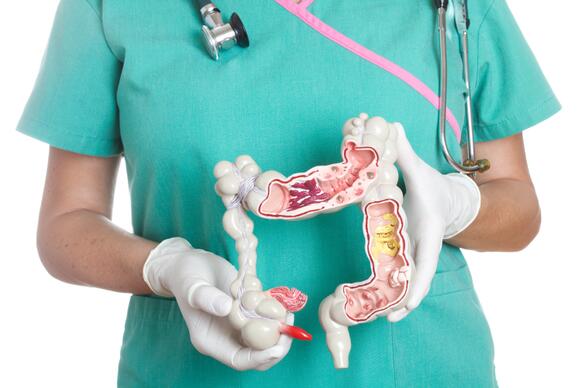Be prepared with the facts.
Appendicitis is an inflamed or infected appendix. The appendix is a 3- to 6-inch long pouch-like structure in the lower right side of the belly. Appendicitis is a medical emergency because an inflamed appendix can rupture and be life threatening. It usually requires immediate appendectomy or surgery to remove the appendix.1. Your appendix is part of the large intestine.
The appendix opens into the large intestine or colon. Most cases of appendicitis result from mucus, stool, or a foreign body becoming trapped inside the appendix and blocking the opening. The appendix then becomes irritated, inflamed or infected. Once this happens, the appendix can rupture or burst and spill its contents into the belly.
2. Lower right belly pain is a hallmark symptom.
The main symptom of appendicitis is belly pain. It often starts near the bellybutton and spreads to the lower right side. Sometimes, the whole belly area is painful. The pain usually occurs suddenly, progresses rapidly, and worsens when you move, take a deep breath, or cough or sneeze. Other symptoms include nausea and vomiting, loss of appetite, fever and chills, constipation or diarrhea, bloating, and an inability to pass gas. If you have symptoms of appendicitis, see your doctor immediately.
The main symptom of appendicitis is belly pain. It often starts near the bellybutton and spreads to the lower right side. Sometimes, the whole belly area is painful. The pain usually occurs suddenly, progresses rapidly, and worsens when you move, take a deep breath, or cough or sneeze. Other symptoms include nausea and vomiting, loss of appetite, fever and chills, constipation or diarrhea, bloating, and an inability to pass gas. If you have symptoms of appendicitis, see your doctor immediately.
3. An inflamed appendix can rupture.
Immediate surgery is the usual treatment for appendicitis because of the high risk of rupture. An inflamed appendix can rupture as soon as 48 to 72 hours after symptoms first start. When this happens, infection can spread throughout the belly and cause a life-threatening condition called peritonitis. An appendectomy will prevent or treat this.

4. A burst appendix increases your risk of infection.
In many cases, people don’t realize they have appendicitis until their appendix bursts. This is more common in very young or very old people. It’s also more common during pregnancy. If your appendix ruptures, you are at risk of developing a life-threatening infection. You can become very ill very quickly. Surgery to remove the appendix and clean out the belly is necessary. Your hospital stay will likely be longer with a burst appendix.
5. You don’t need your appendix.
The function of the appendix is not entirely clear. It may assist the body in fighting infection, but it’s not a necessary organ. After an appendectomy, other organs take over the infection-fighting work of the appendix. So you will have the same level of immunity as you did when you had an appendix. Once you recover from surgery, you will be able to carry out all of your previous everyday activities.
6. Appendectomy has risks you can manage.
Having your appendix out can be a life-saving procedure, but there are risks. The general risks of any surgery include reactions to anesthesia, bleeding, blood clots, and infections. Potential risks of an appendectomy include bowel obstruction, pneumonia, organ damage, and intestinal leakage. Contact your doctor right away if you have severe belly pain, fever, chills, or rectal bleeding. These could be signs of a complication.
7. Most appendectomies are minimally invasive.
Today, most appendectomies are laparoscopic procedures. This means you’ll have smaller incisions and possibly a shorter recovery compared to open surgery. You will likely have laparoscopic surgery if you have simple appendicitis and your appendix is intact. Open surgery may be necessary if your appendix has burst and infection has spread throughout your belly. Your doctor will advise you about which type of surgery is right for you.
8. Recovery takes about two weeks.
You will likely spend some time in the hospital after an appendectomy. How long you stay will depend on the type of surgery and if your appendix burst or not. Doctors usually encourage you to get out of bed and start walking the day of surgery. This helps prevent blood clots and gets your belly working again. Most people resume normal activities within 1 to 2 weeks. Ask your doctor when it’s safe to return to work, school, driving, sex, and sports and leisure activities.


Nice One...
ReplyDelete